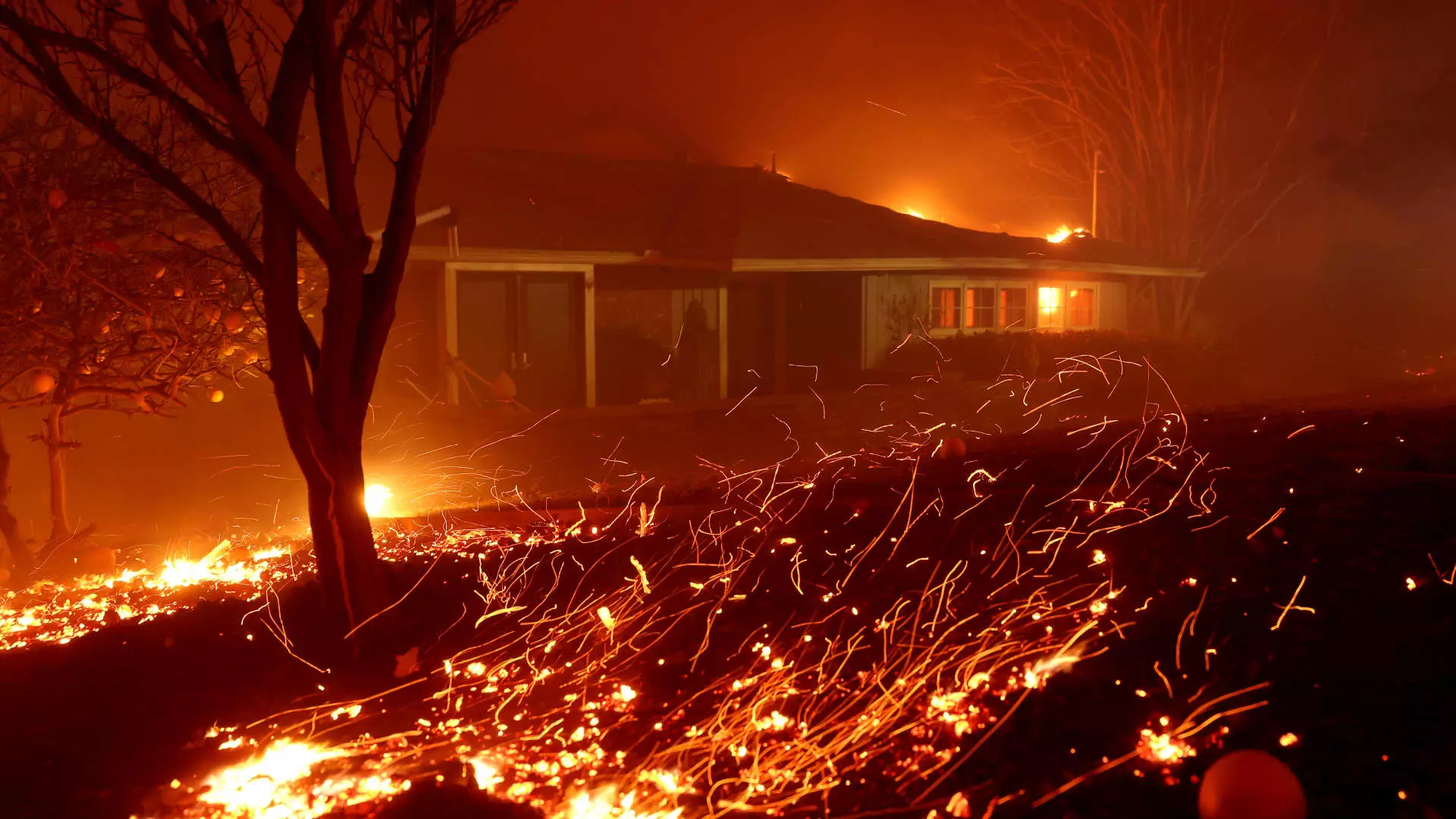The repercussions of climate change have begun to profoundly influence various sectors of the economy, particularly the real estate market. As wildfires rage across regions such as Los Angeles, it is not only the immediate destruction that raises concerns but also the far-reaching effects on property values and insurance costs. Housing markets are facing an unprecedented challenge, largely defined by escalating climate risks, which could reshape the landscape of homeownership in America.
While it’s premature to quantify the overall economic damage caused by recent wildfires, financial experts are already predicting a significant influx in insurance costs. This surge can be attributed to a combination of factors: current underpricing of environmental risks and an inevitable reassessment of these risks due to increasing climate instability. An alarming projection from First Street, a climate-risk firm, foresees that by the year 2055, a staggering 84% of U.S. homes could depreciate in value by an estimated total of $1.47 trillion.
This stark reality illustrates that climate change is no longer a distant threat or an abstract concept. It has become an actionable variable that threatens the underlying assets of homeowners across the country. According to Jeremy Porter, the head of climate implications research at First Street, the implications are significant: “Climate change is no longer a theoretical concern – it is a measurable force reshaping real estate markets and regional economies across the United States.”
Projected increases in insurance costs pose a direct threat to homeowners. Estimates suggest that insurance will escalate by 25% on average over the next 30 years, predominantly influenced by climate-related factors. The financial burden of rising insurance may lead to a decrease in home values, especially in high-risk areas, such as parts of Texas, Florida, and Louisiana. Some homes in these regions could face value cuts by as much as 50% within the next few years.
The founder of DeltaTerra Capital, Dave Burt, emphasizes that the real estate sector may soon witness a dramatic shift echoing the patterns experienced during the 2008 financial crisis. He argues that the insurance industry must reassess its pricing strategies in light of worsening climate risk, which in turn will exacerbate the decline in property values. “The market is fragile, and as costs rise, home values will fall,” Burt asserts, suggesting that a 30% drop in value is not just plausible but probable in the coming years.
The ramifications of climate change extend beyond rising insurance premiums to systemic risks in the broader economic framework. The aftermath of natural disasters, such as Hurricane Sandy, saw foreclosure rates spike dramatically. Such trends could foreshadow similar outcomes in areas prone to climate-induced disasters, thus compounding the financial crisis.
As Ben Keys, a professor at the Wharton School, notes, there is a pressing need for assets to achieve a new equilibrium to stabilize market conditions. With the mortgage market becoming increasingly aware of climate risks, some lending institutions are beginning to adjust their underwriting practices. However, major agencies such as Fannie Mae remain resistant to pricing climate risk directly into their models. This refusal may lead to further market distortions as buyers and sellers find themselves ill-prepared to confront the looming financial upheaval.
Amidst these growing concerns, government responses to climate-related risks seem sluggish. A recent directive from the Trump administration, halting the implementation of the Federal Flood Risk Management Standard, has raised alarms about how public infrastructure will be safeguarded against future flooding issues. This policy change indicates not only a lack of foresight but also a retreat from proactive measures that could mitigate long-term vulnerabilities.
The impact of this policy reversal could be catastrophic as communities remain underprepared for calamities that become more frequent and severe with climate change. Furthermore, the burden of rising taxes to fund resilience measures, as well as increased maintenance costs, will further strain local economies and affect the ability of homeowners to sustain their properties.
The convergence of these factors signifies an urgent need for both individual homeowners and policymakers to act decisively. Raising awareness of the impending threat and implementing adaptive strategies can foster a more resilient real estate market. Homeowners and investors need to reevaluate their portfolios in light of climate risks, while state and federal entities must prioritize proactive policies that integrate climate resilience into urban planning and development.
As climate change continues to unfold, its influence on real estate markets cannot be ignored. Stakeholders must cultivate awareness and preparedness for the inevitable challenges ahead, recognizing that the implications for the housing market are not merely theoretical but an impending reality that requires immediate action and long-term strategic planning.


Leave a Reply